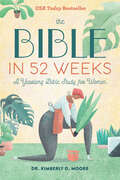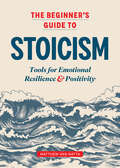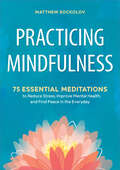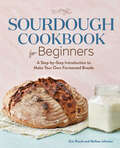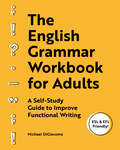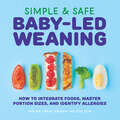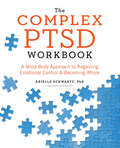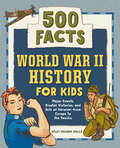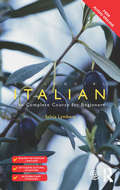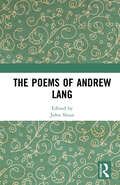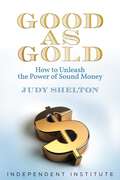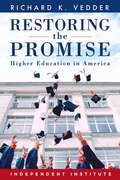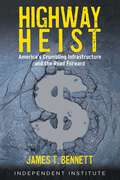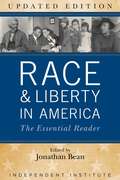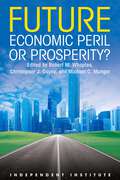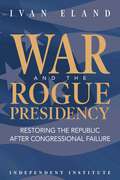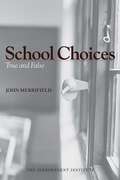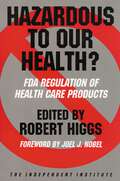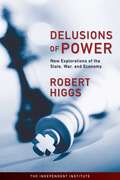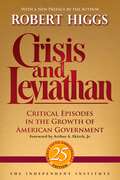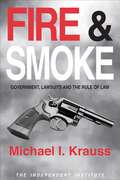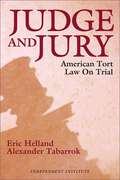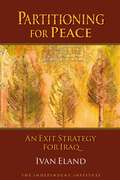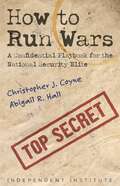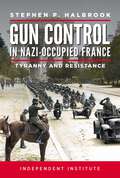- Table View
- List View
The Bible in 52 Weeks: A Yearlong Bible Study for Women (Bible in 52 Weeks)
by Dr. Kimberly D. MooreStrengthen your faith week by week with this yearlong journey through the Bible for women—Now a USA Today bestseller!When you need to lift your spirits or tackle life's challenges, the Bible is always there to offer guidance. This inspiring Bible study for women combines a daily reading plan with weekly opportunities to reflect, discuss, and explore how God's wisdom can be applied to your daily life. The unique approach goes beyond other Christian books for women with:Themed readings for women—All verses for a given week tie together with themes that relate to modern women, like persevering through challenges, moving on from mistakes, and more.Your favorite translation—The included reading plans work with any translation, allowing you to use your favorite Bible to connect with God more deeply.Many ways to study—Explore the interactive questions, Bible journaling prompts, and prayers on your own or in a group setting of any denomination with The Bible in 52 Weeks.Don't forget the companion book—Use this bestselling Bible study alongside Small Group Workbook: The Bible in 52 Weeks for Women and practice your faith with friends and loved ones!Get to know the Word in a new light and strengthen your relationship with Christ in The Bible in 52 Weeks.
The Beginner's Guide to Stoicism: Tools for Emotional Resilience and Positivity
by Matthew Van NattaOptimize joy, overcome obstacles—discover the calm of stoicism Being a stoic means embracing positivity and self-control through the ability to accept the uncertainty of outcomes. With this stoicism guide, the beginner stoic will learn how to take charge of their emotions on the path to sustained happiness and satisfaction. This easy-to-navigate stoicism guide gives you the emotional tools needed to let go of the things you can't control and find joy in what you have. Through thought-provoking strategies and exercises, this book helps you find contentment so you can build closer relationships and become an active member of society. The Beginner's Guide to Stoicism includes: Evolution of stoicism—Discover the history of stoicism and how its principles can help you find peace. Complete the mindset—Find acceptance using an essential emotional toolkit based on the disciplines of Desire, Action, and Assent. Time to reflect—Apply what you've learned to your own life with ethical questions, quotes, and exercises. Change your perception, focus on positivity—become the best version of yourself with The Beginner's Guide to Stoicism.
Practicing Mindfulness: 75 Essential Meditations to Reduce Stress, Improve Mental Health, and Find Peace in the Everyday
by Matthew SockolovCalm the mind and begin the path to finding peace with these simple mindfulness meditations Mindfulness is an evidence-based method for reducing stress and anxiety, enhancing resilience, and maintaining mental well-being. Even short meditations can turn a bad day around, ground us in the present moment, and help us approach life with gratitude and kindness. This mindfulness book was created by the founder of One Mind Dharma. He developed these 75 essential exercises to offer practical guidance for anyone who wants to realize the benefits of being more mindful.This inviting mindfulness book for adults includes:Evidence-based advice—Find expert advice on dealing with distorted or wandering thoughts and how to handle mental blocks.Meditations that grow with your confidence—Early meditations in Practicing Mindfulness take just 5 minutes and are highly accessible. As they progress, exercises grow with the reader, building on previous lessons to develop a transformative mindfulness practice.Meditations for specific situations—With meditations designed for specific situations or emotions, even experienced practitioners will have a continuing resource for mindfulness at every moment.Begin a journey of peace and patience with Practicing Mindfulness: 75 Essential Meditations to Reduce Stress, Improve Mental Health, and Find Peace in the Everyday.
Sourdough Cookbook for Beginners: A Step-by-Step Introduction to Make Your Own Fermented Breads
by Melissa Johnson Eric RuschGive your sourdough a healthy start—a sourdough cookbook from the creator of Breadtopia Sourdough bread is iconic for its crispy crust, airy and springy crumb, and unique tangy flavor—and it all begins with a fermented, yeasty concoction called a starter. While the process may seem extensive, The Sourdough Cookbook for Beginners, brought to you by the owner and creator of Breadtopia, will show you how easy it can be to whip up a delicious array of artisanal sourdough breads with just a few ingredients, simple tools, and a little bit of patience. This sourdough cookbook pairs simple instructions with tutorial photos, covering the first 6 days of bringing your starter to life and helping it thrive. Explore the science of how sourdough starters make bread rise along with how to prep your kitchen, plus tips and tricks you may have seen on Breadtopia. Then, try your hand at dozens of crusty artisan-style breads, flavored pan loaves, pastry, pizza, and even unique baked goods you can make with the leftover starter! This sourdough cookbook includes: Fresh start—With advice straight from Breadtopia, explore a walkthrough of making, feeding, storing, and reactivating starters, as well as what factors can influence fermentation and flavor. Knead-to-know—This sourdough cookbook provides a complete walkthrough of bread baking, plus beginner recipes, a handy glossary, and troubleshooting tips for every step. On the rise—The recipes in this sourdough cookbook, including some of the best from Breadtopia, progress from a Basic No-Knead bread to a more difficult Chocolate Babka so you can expand your skills as you go. Enjoy the sweet smell of sourdough success with the The Sourdough Cookbook for Beginners.
The English Grammar Workbook for Adults: A Self-Study Guide to Improve Functional Writing
by Michael DiGiacomoThe engaging, self-guided way to sharpen your grammar and write better!Mastering English grammar can be a real challenge. But never fear! The English Grammar Workbook for Adults is here to help improve your writing fluency so you can feel confident while crafting emails, cover letters, birthday cards and more.No matter your current skill level, this English grammar workbook has everything you need to learn essential elements, including nouns, verbs, adjectives, adverbs, tenses, and beyond. Then, you'll apply what you've learned to everyday situations you could encounter at school, at work, social situations, creative writing, online, and more.Fun & functional—This clear, concise book is essential for ESL/EFL and other grammar students who want to work on writing English.Situational success—Get expert tips on how grammar applies to real-world scenarios.Easy to use—Find quick answers to your English grammar questions using text boxes and the expanded index in the back of the book.Learning how to communicate more clearly is a snap with The English Grammar Workbook for Adults.
Simple & Safe Baby-Led Weaning: How to Integrate Foods, Master Portion Sizes, and Identify Allergies
by Malina Malkani MS, RDN, CDNYour safe and healthy guide to baby-led weaning for babies 6 to 12 monthsStart your little one on solid foods the healthy way. Simple & Safe Baby-Led Weaning empowers you to help your baby feed themselves while they develop motor skills and an adventurous palate. This comprehensive BLW book provides parents with the necessary knowledge and confidence to embark on the weaning journey. Learn when to begin baby-led weaning and what to expect along the way, while also getting practical advice for creating balanced, whole-food meals that your baby can eat alongside the rest of the family.Go beyond other baby food books about feeding, with advice for:Getting started—Discover a basic overview of how baby-led weaning works, and find out if and when it's the right approach for your baby.Staying safe—Breathe easy with safety guidelines that include information on prohibited foods and smart kitchen habits.Identifying allergies—Find out how to navigate allergies and sensitivities as your baby tries new foods for the first time.Help your baby take the lead on their exploration of solid foods with this accessible and wholesome baby-led feeding book.
The Complex PTSD Workbook: A Mind-Body Approach to Regaining Emotional Control and Becoming Whole (Healing Complex PTSD)
by Arielle Schwartz PhDA mind-body workbook for healing and overcoming Complex PTSDThose affected by complex PTSD, or C-PTSD, commonly feel as though there is something fundamentally wrong with them—that somewhere inside there is a part of them that needs to be fixed. Facing one's PTSD is a brave, courageous act—and with the right guidance, recovery is possible.In The Complex PTSD Workbook, you'll learn all about C-PTSD and gain valuable insight into the types of symptoms associated with unresolved childhood trauma. Take healing into your own hands while applying strategies to help integrate positive beliefs and behaviors.Discover your path to recovery with:Examples and exercises—Uncover your own instances of trauma with PTSD activities designed to teach you positive strategies.Expert guidance—Explore common PTSD diagnoses and common methods of PTSD therapy including somatic therapy, CBT, and mind-body perspectives.Prompts and reflections—Apply the strategies you've learned and identify PTSD symptoms with insightful writing prompts.Find the tools you need to work through C-PTSD and regain emotional control with this mind-body workbook.
World War II History for Kids: 500 Facts (History Facts for Kids)
by Kelly Milner HallsIncredible World War II facts for curious kids ages 8 to 12Kids don't need long, boring textbooks to learn about history! Starting with the events that set the stage for war and finishing with its aftermath, World War II History for Kids helps them explore the past through interesting and memorable facts they can share with their friends and family.Go beyond other World War 2 books for kids with:500 facts—This book teaches kids all about the heroism and horrors of World War II, one informative tidbit at a time.The complete timeline—Kids will learn all about important people, places, and events from before, during, and after the war.A leg-up on learning—These facts provide kids with a head start on the topics they'll be covering in class, plus things they might not learn in school.Help young learners better understand what happened during WWII with this engaging, fact-driven history book.
Colloquial Italian: The Complete Course for Beginners (Colloquial Series)
by Sylvia LymberyColloquial Italian: The Complete Course for Beginners has been carefully developed by an experienced teacher to provide a step-by-step course to Italian as it is written and spoken today. Combining a clear, practical and accessible style with a methodical and thorough treatment of the language, it equips learners with the essential skills needed to communicate confidently and effectively in Italian in a broad range of situations. No prior knowledge of the language is required.Colloquial Italian is exceptional; each unit presents a wealth of grammatical points that are reinforced with a wide range of exercises for regular practice. A full answer key, a grammar summary, bilingual glossaries and English translations of dialogues can be found at the back as well as useful vocabulary lists throughout. Key features include: A clear, user-friendly format designed to help learners progressively build up their speaking, listening, reading and writing skills Jargon-free, succinct and clearly structured explanations of grammar An extensive range of focused and dynamic supportive exercises Realistic and entertaining dialogues covering a broad variety of narrative situations Helpful cultural points An overview of the sounds of Italian Balanced, comprehensive and rewarding, Colloquial Italian is an indispensable resource both for independent learners and students taking courses in Italian Audio material to accompany the course is available to download free in MP3 format from www.routledge.com/cw/colloquials. Recorded by native speakers, the audio material features the dialogues and texts from the book and will help develop your listening and pronunciation skills.
The Poems of Andrew Lang
by John SloanAndrew Lang (1844–1912) made his name in the last quarter of the Victorian era in a remarkable number of literary and intellectual fields, as popular poet, influential literary critic, editor of the classic series of Fairy Books for the young, and as author of groundbreaking books on anthropology, Homeric scholarship, folklore and history. This is the first annotated edition of Lang’s poems, bringing together his books of verse and over 150 additional poems, many of them collected for the first time.John Sloan’s introduction provides a compelling account of Lang’s achievements as a poet whose first two books of verse, Ballads and Lyrics of Old France and Ballades in Blue China, were a harbinger of the English aesthetic movement. Lang helped to create an abiding interest in French poetry and to encourage a new spirit of literary cosmopolitanism in England. He also widened the appeal of poetry in an age of new knowledge, advancing literacy and the growth of the popular press. The authoritative text is accompanied by extensive notes identifying important allusions and significant connections between the poems and Lang’s other writings. In the headnote to each poem, the reader will find a record of publication history, textual variants and sources, including details of the original sources of Lang’s verse translations from the French, Greek and Latin.The edition offers an invaluable guide to the study of Lang’s poetry for students and scholars of nineteenth-century British poetry.
Good as Gold: How to Unleash the Power of Sound Money
by Judy SheltonFrom financial crises, to pandemic price-spikes, to recurring cycles of inflation, everyone agrees: the economy has seen better days.But as soon as pundits and politicians start discussing economics, things get murky. Most books ask more questions than they answer. Most books...but not this one. Judy Shelton—Senior Fellow at Independent Institute, former Chairman of the National Endowment for Democracy, and critically acclaimed monetary economist—has written a book with answers. And not a moment too soon. With clarity and moral courage, Shelton charts the course to a brighter future. She&’s one of the few economists bold enough to challenge the inflationary policies of the Federal Reserve, emphasizing how today&’s policies enrich elites at the expense of—you guessed it—poor and middle-class Americans. This, Shelton insists, must end. And it can end—easily. But Shelton doesn&’t stop there. Her vision is for not only America but also for people around the world. Global, economic upliftment, she insists, need not come at the expense of domestic prosperity. We can have both—but not without a sound and stable U.S. currency. And history is very clear on this point. When the U.S. dollar is backed by gold, America prospers, and so does the rest of the world. In this book, Shelton casts a powerful vision that is as revolutionary as it is time-tested...a vision that shows how the future American dollar can perform as good as gold... ...or even better. But this is no curmudgeonly demand to return to the gold standard of yore. Neither is it a demand to return to the Bretton Woods era. Instead, Shelton offers something new: an explanation of how we can use gold for a new international monetary order. Step by step, she lays out how gold can provide a universal measure of value across borders, create new financial opportunities, and dramatically increase prosperity around the world. If you care about the poor, rich, and everyone in between, you have to read this book ... and discover: · how price stability functions as the foundation for productive economic growth; · how political freedom and economic freedom are fundamentally linked ... and how one cannot exist without the other; · how to reconcile the stability of America&’s domestic currency in a global context; · the proper role of government in the economy; · and much, much more ... Writing with a sober but hopeful voice, Shelton is no ordinary economist. With grace, intellectual rigor, and unmatched passion, this book is a must-read for anyone invested in the future of the American—and global—economy. You'll walk away with more answers than questions—a rare experience for anyone who reads about monetary policy.
Restoring the Promise: Higher Education in America
by Richard K. VedderHigher education in America is in crisis. Costs are too high, learning is too little, and the payoff to students and society is increasingly problematic. In Restoring the Promise, Richard Vedder shows how the precarious position of colleges and universities results from a mostly unsuccessful expansion of governmental involvement in the academy, especially at the federal level.The book examines today&’s most serious issues in higher education, including free speech and academic freedom; tuition and other costs; culture and curricula; governance; gender, race and diversity; due process; admissions; student loans; and much more. It diagnoses problems and identifies solutions. For example, the total cost of college per student in the United States is now higher than in any other country. When combining the monetary costs of college with the opportunity costs of losing years of labor to the economy, the true cost of higher education to American society well exceeds one trillion dollars annually. Yet, despite American higher education&’s immense price tag, students are learning less than ever before and continue to be underemployed. The book discusses the three &“I&’s&” of university reform: information, incentives, and innovation. Without information, it is impossible for taxpayers and governing authorities to ensure that public education spending truly furthers the broader interests of society rather than the narrow interests of faculty and administrators. Shaping incentives for management would help to reduce costs and improve quality. Business practices such as Responsibility Centered Management (RCM), for example, allow profit to motivate efficiency and encourage learning outcomes. And expanding the use of innovation in technology and open online courses, along with relinquishing old rules such as tenure and three-month summer vacations, offer new hope for institutions of higher education. The book discusses such additional reforms as the following: Ending or revising the federal student financial aid program Giving departments or even professors a share of overall revenue based on student enrollments in their classes. Departments or professors would then be required to pay their share of travel, building rental, maintenance, utilities, and other such costs from the revenues they receive Providing earnings data on former students by college five, ten or fifteen years after matriculation. Prospective students (and parents) as well as lawmakers and oversight officials would be assisted regarding school successes and failures Increasing faculty teaching loads Instituting three-year degrees and year-round instruction Ending discrimination against for-profit schools Ending grade inflation Ending speech codes and other barriers to academic freedom Ending affirmative action and related diversity programs And more...
Highway Heist: America's Crumbling Infrastructure and the Road Forward
by James T. BennettIn this eye-opening book, Professor James Bennett guides readers through centuries of one of the most underrated yet widely used aspects of American life—roads.Relying on history and economic data—and with a humorous and oftentimes sharp tongue—Bennett explains how important America's highways and byways have been to everything from policymaking to everyday life. Crafting America's roads took persuasion, planning—and more taxes than any politician could have dreamed of. And far too often their realization, thanks, in Bennett's view, to flawed interpretations of the power of eminent domain, required destruction, sometimes on a massive scale, of long-established neighborhoods and important cityscapes. Likewise, the upkeep of America's highways has been the center of many a policy battle, waged by Republicans and Democrats alike. Yes, we all want roads in good working condition—but just how and who will pay for them remain contentious questions. Bennett argues persuasively that the road forward just might be a second, but more serious, sustained look at, and local experimentation with, private roads and toll roads.Agree or disagree with him, Bennett has written a significant contribution to America's ongoing debate about how her citizens should traverse, from "sea to shining sea," its fruited plain.
Race and Liberty in America: The Essential Reader
by Jonathan BeanIn this long-awaited updated edition of Race & Liberty in America: The Essential Reader, editor Jonathan Bean presents the timeless and urgent insights classical liberalism has to offer our troubled and polarized time.In 2009, when Race & Liberty in America: The Essential Reader was originally published, there was a spirit of optimism surrounding race relations. Fifteen years later, a far different spirit prevails: one fraught with tensions, many regrettably familiar and some new. Which raises the question: What happened? And more importantly: How can we set things right? With new contributions from Thomas Sowell, Coleman Hughes, Thomas Chatterton Williams, Wilfred Reilly, Kenny Xu, David Bernstein, and Ilya Somin—as well as a plethora of primary source evidence from recent landmark US Supreme Court decisions—Bean champions the values of colorblindness, freedom, and equal constitutional protection for all individuals—regardless of race. It&’s a message that couldn&’t be more timely. This first collection of writings on race and immigration to document the role of the classical liberal tradition—a tradition rooted in natural law principles of individual rights and liberty—reveals: Why classical liberals have espoused &“unalienable Rights&” derived from God, individual freedom from government control, the Constitution as a guarantor of freedom, color-blind law, and capitalism; How classical liberals led the fights against slavery and racism against seemingly insurmountable odds and long before such positions became popular; What classical liberals&’ defense of a &“natural right&” to migration implies for today&’s immigration controversies; How capitalism undermines racism by penalizing those who act on their &“taste for discrimination&”; Why America&’s obtuse preoccupation with left-versus-right politics overshadows solutions to racial division; How we can improve race relations in the United States today; And much, much more… From the Declaration of Independence, the antislavery movement, post–Civil War reconstruction, the Progressive Era, the Great Depression and World War II, the civil rights era, George Floyd and Black Lives Matter, all the way up to the present day—each chapter in this new and improved updated edition illuminates how specific time periods in American history grappled with the demands of equality. Citing such influential Americans as Thomas Jefferson, Louis Marshall, Frederick Douglass, Booker T. Washington, and Zora Neale Hurston, plus those missing from other books and heretofore lost to history, Bean shows how classical liberal thought on race relations has helped shape both law and public opinion … and how it will need to do so again, if America as we know it is to prosper and thrive. If you&’re ready to trade the tired and failed left-versus-right politics for timeless principles that actually work and uplift societies, read Race & Liberty in America.
Future: Economic Peril or Prosperity?
byWhat will the economy look like in fifty years? How will our lives as consumers and workers be transformed by the coming innovations in technology, the marketplace, and the workplace? How will changes in demographics and dependency affect our political system? Will economic freedom rise or fall? What, if anything, would greater prosperity do for one&’s total well-being?Future: Economic Peril or Prosperity? poses these and related questions to a diverse group of economists whose predictions will inspire thoughtful consideration and debate. As co-editor Robert M. Whaples writes in the introductory chapter, &“The predicted changes range from innocent innovations that will make life a bit more comfortable...to potentially chilling technologies that might strip our human dignity.&” Just as important as the book&’s predictions are its insights into how we should think about an uncertain future. As humorist and social critic P. J. O&’Rourke shows in his erudite chapter on self-fulfilling prophecies, wildly wrong predictions are not limited to the likes of a Nostradamous or a Karl Marx: even a Nobel laureate economist running a billion-dollar hedge fund can lose the farm (and other people&’s money) through an overly confident misreading of the economic tea leaves. And yet, perhaps only by delving more deeply into long-term forecasting, and reflecting on past mistakes, can we minimize the hubris that so often clouds the judgments of prognosticators in academia, business, and—perhaps especially—government. Informative, contentious, and at times inspirational, Future: Economic Peril or Prosperity? is an invaluable aid for anyone who understands the need to prepare for the future, even if that future cannot be fully anticipated.
War and the Rogue Presidency: Restoring the Republic after Congressional Failure
by Ivan ElandIn War and the Rogue Presidency, Ivan Eland shows that almost immediately after the nation&’s founding, starting with the first presidency of George Washington, the executive&’s role in defense and foreign policy began expanding past what the framers of the Constitution had envisioned.The Constitution enshrined Congress as the dominant branch of government, giving Congress, not the President, most of the powers in defense and foreign policy. This comprehensive book shows how the presidential aggrandizement of greater powers has only been possible because of congressional abdication. However, this expansion of the executive&’s role was still relatively contained until the Cold War when undeclared, permanent war became ongoing policy, and then the post-9/11 war on terror dramatically expanded the President&’s role. Such expansion has had deleterious effects on U.S. foreign policy abroad, as well as a major erosion of the republic, its security at home, and the liberties of American citizens. War and the Rogue Presidency is an in-depth examination of the history of the congressional-executive tug-of-war over U.S. security policy and why reclaiming constitutional standards is essential to restore both an effective national defense and civil and economic liberties. To get Congress to do that, Dr. Eland presents ways in which internal congressional incentives could be changed to provide motivation for legislative pushback. As a result, the book suggests important actions Congress could take for such a pushback along with other reforms that would effectively rein in the rogue presidency.
School Choices: True and False
by John MerrifieldThe school choice movement has gained political momentum in recent years, with programs having been established in Milwaukee, Florida, Texas, and elsewhere. But today&’s programs are nothing like the "free market in education" proposed four decades ago by the early proponents of school choice.Economist John Merrifield shows that the "school choice" movement has become mired in false alternatives, petty distinctions, and diminished vision. Yet, he argues that programs providing real educational choices must not be allowed to fail like so many government programs—a freely competitive market for education must remain the ultimate goal. School Choices: True and False charts a course for the achievement of this goal.
Hazardous to Our Health?: FDA Regulation of Health Care Products
by Robert HiggsThe Food and Drug Administration (FDA) is one of the most powerful of federal regulatory agencies, if not the most powerful. It regulates over 25% of all consumer goods sold in the United States. It makes decisions on a daily basis that affect the lives of millions of people.While the FDA was created to protect the public, how well is it fulfilling this mission and whose interests is it actually protecting? In this book, four outstanding scholars examine how the FDA accumulated its enormous power and what effects it has had on the public. It also explores who actually benefits and loses from FDA actions, and whether alternatives exist to safeguard the health of Americans. This book raises serious questions about the wisdom of giving policing power with little oversight or appeal process to scientists, as the FDA currently does. It also argues forcefully that the FDA unnecessarily delays beneficial medicines and medical devices, many of which are routinely available in Europe, from being available to Americans.
Delusions of Power: New Explorations of the State, War, and Economy
by Robert HiggsIn Delusions of Power, economic historian Robert Higgs calls into question our ingrained notions concerning the nature of the state and democracy. Higgs uproots the foundation stone upon which the state&’s powers have rested and grown unchecked by the public.Beginning with the Founding Fathers and moving forward, Higgs reassesses the world wars, the Great Depression and the New Deal, and the financial debacle that began in 2008 with the view of demonstrating Americans&’ loss of liberties. He brings together the crisis in policymaking; key political actors and events; and the impact of war on the economy and civil liberties. For Higgs, war and its costs have had a major impact on American life and freedom. Through reading Higgs&’s work, one will gain a new understanding of the state&’s power, democracy, and the issues threatening the pursuit of liberty. Taking a close look at the dense fabric that our government weaves between war, state power, and economics, this collection of essays reveals the growing authority—and corruption—of the American state. Covering topics from the Lyndon Johnson presidency to the provocatively titled article &“Military-Economic Fascism&” on the military-industrial-congressional complex, it argues that the U.S. government consistently exploits national crises and then invents timely rhetoric that limits the rights and liberties of all citizens for the benefit of the few, be they political leaders or various industrialists in the areas of defense and security. As its title suggests, this book presents a clear narrative of trends and events—from the United States&’ entry into World War II to the origins of income tax—causing individuals to question whether those in power are truly blind to the effects and causes of their policies.
Crisis and Leviathan: Critical Episodes in the Growth of American Government
by Robert Higgs Arthur A. Ekirch Jr.Discussing how government has continually grown during the past century, this account demonstrates that the main reason lies in government&’s responses to national &“crises&” (real or imagined), including economic upheavals and, especially, war. The result, this book argues, is the ever-increasing government power, which endures long after each crisis has passed, impinging on both civil and economic liberties and fostering extensive corporate welfare.Everyone knows that the U.S. government has grown in size, scope, and power during the past century, but how did this breathtaking transformation come about? Crisis and Leviathan offers a coherent, multi-causal explanation, guided by a novel analytical framework firmly grounded in historical evidence. Integrating the contributions of scholars in diverse disciplines, including history, law, political philosophy, and the social sciences, this book makes compelling reading for all those who seek to understand the transformation of America&’s political economy over the past century. One of the most important books ever written on the nature of government power, Crisis and Leviathan is a powerful work of first-rate scholarship whose message becomes more important with each passing day.
Fire & Smoke: Government, Lawsuits, and the Rule of Law
by Michael I. KraussThe state of Mississippi&’s lawsuit against tobacco companies in 1994 was quickly emulated by more than a dozen other states and then the federal government. Not to be outdone, more than a dozen cities and the federal government have followed the City of New Orleans&’s lead and sued gun manufacturers. Do these lawsuits signal new directions for more effective public policy or a new and dangerous trend whereby governments use tort law to achieve public policy objectives they were unable to accomplish legislatively? In this new policy report, so-called government &“recoupment&” lawsuits are carefully examined and found to be flagrant abuses of the constitutional separation of powers, seriously undermining over two hundred years of common-law torts adjudication. Author Michael Krauss, a leading legal scholar on the relationship between tort law and personal freedoms, systematically dissects the tobacco and firearm recoupment lawsuits. He shows how such lawsuits betray every criterion of sound, effective, and just tort law. The lawsuits against gun manufacturers can show no damages, no proximate causation, and no wrongdoing. Similarly, governments have no direct damages to claim against tobacco manufacturers and cannot legally stand in the place of individual smokers or their families. Fire & Smoke concludes that recoupment lawsuits are incompatible with civil freedoms, representative democracy, and the rule of law upon which institutions of a free society depend.
Judge and Jury: American Tort Law on Trial
by Alexander Tabarrok Eric HellandWith inordinate amounts of money spent in the United States on lawyers and lawsuits and multi-billion-dollar settlements growing each year, the very timely book Judge and Jury asks, "Is the tort system benefiting the public?"In Judge and Jury, the fear of litigation is shown to reduce innovations, drive physicians and manufacturers out of lawsuit-prone specialties, and increase manufacturing and consumer costs. In the courts, data from thousands of cases all over the country demonstrate that tort system awards are driven by political factors such as judicial elections, jury compositions, and the location of courts themselves. This book assembles the unprecedented findings and insights by authors Eric Helland Alexander Tabarrok, who have pioneered economic and legal research into the injustice and enormous costs created by the politicization of the tort law. Seeking to reverse the extremely harmful trends in tort law, Judge and Jury assembles innovative alternatives for reforming the tort system and charts a course toward re-establishing fair civil justice for all in the United States.
Partitioning for Peace: An Exit Strategy for Iraq
by Ivan ElandCombining a history of Iraq and its dominant sects with an acute awareness of the political machinations fomenting worldwide, this keen military analysis offers a practical exit strategy for U.S. armed forces in Iraq.Since the history of violence in multi-ethno-sectarian states indicates that such conflicts usually resurface once an occupying force leaves, a solution to end the violence and stabilize the country must be geographically reasonable for sectarian groupings. Ivan Eland explains why partitioning, a solution that has been successful in other chaotic political situations, can be a uniquely effective political and military exit strategy for a country like Iraq. Finally, Dr. Eland documents fifteen lessons that can be learned from previous partitions during the 20th and 21st centuries and applies them directly to the current situation in Iraq.
How to Run Wars: A Confidential Playbook for the National Security Elite
by Christopher J. Coyne Abigail R. HallA copy of the top-secret memo below recently came into our hands, and we thought we should bring it to your attention! &“Dear National Security Elite: In an ideal world, the public would simply accept whatever their leaders—you, in other words—told them. They would comply with restrictions and mandates, not as a matter of mere obedience, but as a matter of unquestionable patriotic duty. But we don&’t live in an ideal world. And with the fate of the world, especially the world&’s wars, in the hands of our enlightened, benevolent, and eminently responsible national security elite—in your hands, in other words—we can&’t afford to risk opening the conversation to an informed public. And we certainly can&’t risk asking for anything so antiquated as &“consent,&” either. Not when the stakes are this high. You simply must learn: How to control the narrative—every narrative—in your favor; How to completely capture the media and effectively quash dissent; How destroying liberty creates more liberty in the long (long) run; Why top-down economic planning, here and abroad, is your best friend; How to flout international, and of course domestic, law and get away with it; And much, much more... The danger with any book like this is, obviously, that it may fall into the wrong hands. If any member of the general public should happen upon these pages, the consequences would be fatal. After all, people may realize that the national security elite—you, in other words—are not, in fact, all-powerful harbingers of peace... They may realize that you are, literally, a force for good... armed and relentlessly attempting to bend the planet to your noble will. And that realization would be nothing short of disastrous. Don&’t let this book fall into the wrong hands!&” Merciless in their penetrating analysis, Christopher J. Coyne and Abigail Hall have written the satirical portrait of America&’s contemporary military-industrial complex. Drawing inspiration from the 1936 classic How to Run a War, by Bruce W. Knight, this book is a must-read for anyone who would know the truth about America&’s endless wars and the people who run them.... The truth might just set us free. It will certainly make you laugh. Then—really angry.
Gun Control in Nazi-Occupied France: Tyranny and Resistance
by Stephen P. HalbrookIn Gun Control in Nazi-Occupied France: Tyranny and Resistance, Stephen P. Halbrook tells this story of Nazi repression and the brave French men and women who refused to surrender to it.Nazi Germany invaded France in 1940. In every occupied town, Nazi soldiers put up posters that demanded civilians surrender their firearms within twenty-four hours or else be shot. Despite the consequences, many French citizens refused to comply with the order. Taking advantage of a prewar 1935 French gun registration law, the Nazis used registration records kept by the French police to easily locate gun owners to enforce their demand that firearms be surrendered. Countless French citizens faced firing squads for refusing to comply. But many French citizens had resisted the 1935 decree, preventing the Nazis from fully enforcing the confiscation order. Throughout the Nazi occupation, the French Resistance grew, arming itself to conduct resistance activities and fight back against the occupation. Drawing on records of the German occupation and testimonies from members of the French resistance, Gun Control in Nazi-Occupied France is the first book to focus on the Nazis&’ efforts to disarm the French.
